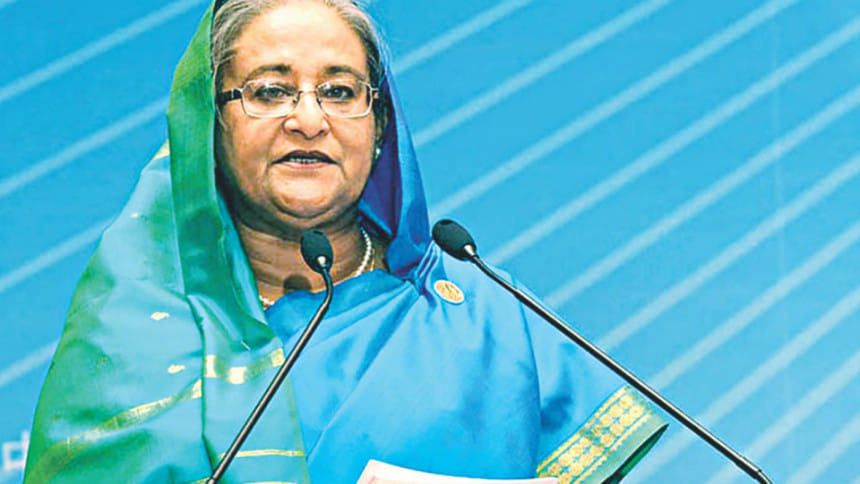Our expectations from the new leadership

The prime minister's call to party-men and supporters to remain calm and exercise restraint after assuming office for the third consecutive term strikes well with the ethos of a responsible democratic polity. It would not be naïve or asking for the impossible if citizens desire to see a transformative leadership in PM Sheikh Hasina in her new term in office.
The people are looking forward to a new direction, a new era, a new life. It can be the time for shaping and moulding a new society, for giving a new and clear orientation to the nation. It could also be the golden moment to start transforming our task-oriented society into a modern society. Such a modern Bangladesh has to be a land of opportunity and not opportunism.
In the wake of the huge victory, let us remind ourselves that in the sub-continental perspective, the people have risen to great heights when they have basked in the glow of noble kings or leaders; and significantly, regimes and kingdoms have been destroyed not by adversity but by abasement. The point to note is that corruption is the greatest solvent of public institutions; poverty poses a far smaller threat. The call of the day, therefore, is to provide moral leadership which the people are yearning and waiting for. People need to be served by vision and imagination.
There is no denying that a significant indicator of the resilience of a polity is the extent of its financial accountability and discipline. That being so, the paramount need to remedy and punish the huge indiscretions committed in the banking sector brooks no further delay. If exhortations and persuasions do not produce results in disciplining the loan defaulters then the coercive powers of the State need to be resorted to. When civil laws are blatantly flouted by not-so-civil elements the long arm of the law has to be used to ensure fair play.
Let us remember that while the depositors are the real owners of the banks, in reality the hapless and helpless customers have none to effectively protect their interests. In such a lackadaisical state shady directors have a free rein to play with depositors' money. The need is to discipline the mega loan-defaulters and stop the indiscretion of the bank directors to sustain public confidence in banking system.
On the economic front, broadly speaking, Sheikh Hasina's government may consider to achieve the following four objectives:
(i) to increase the gross national product and transmute the people's spirit of enterprise into national wealth;
(ii) to create jobs and enlarge the availability of productive works;
(iii) to regulate reasonably the distribution of income; and
(iv) to revive public morality and reward integrity and industry.
The reality is that we have hardly an economic problem which would be beyond the capacity of a knowledgeable organiser with an iron will. A strong leader with a huge mandate realises that development begins with people and not with goods. Such leaders can evoke the response from the people, without which governmental plans turn to ashes.
Can we hope that the inspirational leadership of Sheikh Hasina would be such that every class of citizens is motivated to put the nation above the party and we will see a shift in importance from privilege to talent and from accident of birth to accent on calibre in all public affairs? Shall we aspire to see that money would be regarded as something to be earned rather than to be got or won? Simultaneously, must we not stop our society from disintegrating into factions and divisions?
Societal cohesiveness is critically important because in a country where all the groups function harmoniously, the results are fantastically gratifying—totally out of proportion to the inputs. Germany and Japan are examples of the synergistic effect of such harmonious cooperation.
We would do well to remember that the staying power of democracy varies from country to country. The timing of political breakdown depends upon the strengths of political institutions. Collapse may not overtake a country marked by economic failure where the political institutions have acquired durability through age and tradition.
Let us also remember that "Republics are created ... by the virtue, public spirit and intelligence of the citizens. They fall when the wise are banished from the public councils because they dare to be honest and the profligate are rewarded because they flatter the people in order to betray them". Citizens of Bangladesh wish and pray that Prime Minister Sheikh Hasina's government will be limited not in responsibility but by the rule of law and by the discipline of the constitution.
Muhammad Nurul Huda is a former IGP.





Comments